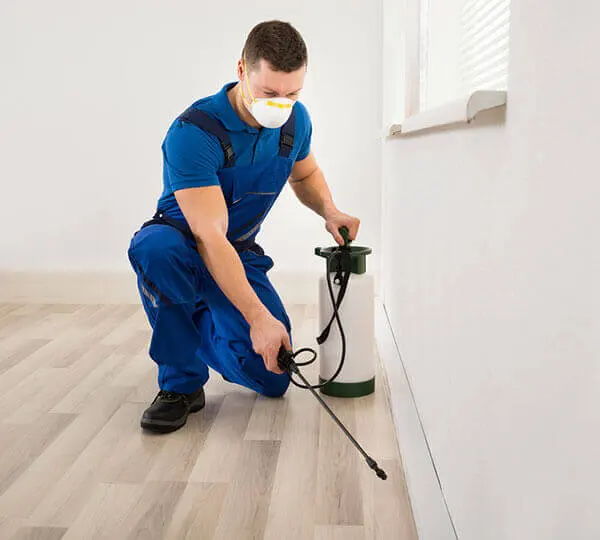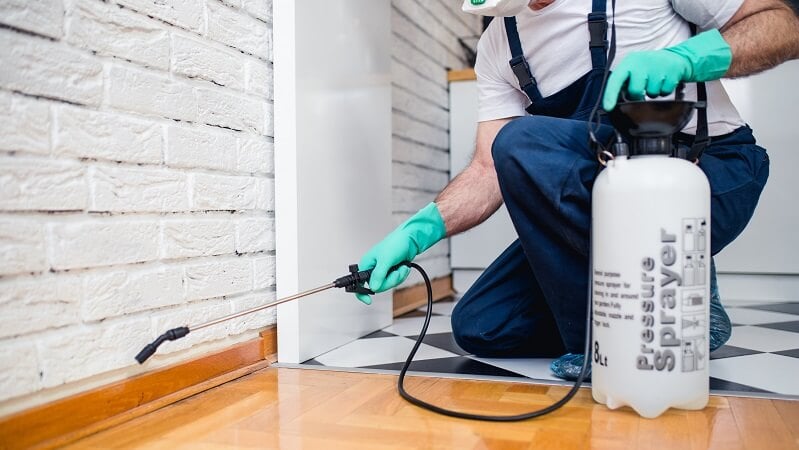Pest Control Clovis: Eliminate Pests Once and for All
Pest Control Clovis: Eliminate Pests Once and for All
Blog Article
Recognizing the Different Strategies to Bug Control: A Comprehensive Overview

Natural Insect Control Techniques
Using green strategies such as buddy planting and organic insect control is essential for successfully handling parasites in farming settings. Companion planting includes growing various plants in closeness to prevent pests, enhance nutrient uptake, and boost general crop wellness.
Organic pest control entails presenting natural killers or microorganisms to control pest populaces. Ladybugs, for instance, prey on aphids, managing their numbers without the need for chemical pesticides. An additional example is the usage of Bacillus thuringiensis (Bt), a germs that targets specific insect parasites while being harmless to human beings, animals, and beneficial pests.
These environment-friendly methods not just reduce the dependence on synthetic chemicals but likewise help protect biodiversity and dirt health and wellness. By including natural parasite control methods into farming techniques, farmers can accomplish lasting pest monitoring while minimizing unfavorable effect on the atmosphere.

Chemical Pest Control Solutions
Along with all-natural pest control techniques, the application of chemical pest control options plays a substantial role in successfully taking care of pest populations in agricultural atmospheres. Chemical parasite control solutions are formulated to target certain parasites that might cause comprehensive damage to plants. These remedies often include synthetic pesticides that are created to remove pests quickly and efficiently.
One of the essential advantages of chemical bug control options is their performance in controlling insect invasions widespread. Farmers can apply these services utilizing numerous methods such as spraying, airing out, or seed therapy to safeguard their plants from hazardous insects, weeds, and illness. Additionally, chemical insect control solutions are relatively simple to apply and can offer fast results, aiding farmers safeguard their returns and minimize economic losses.
Nevertheless, it is crucial to utilize chemical pest control options deliberately to minimize prospective unfavorable effect on the atmosphere, non-target microorganisms, and human health and wellness. Correct application techniques, adherence to safety guidelines, and regular tracking are critical to guarantee the liable use of chemical pest control options in farming methods.
Organic Insect Control Approaches
Organic insect control comes close to take advantage of all-natural predators or virus to manage bug populations in farming setups efficiently. This approach provides a lasting and green solution to pest administration, lowering the reliance on artificial chemicals and minimizing harm to the atmosphere. One usual biological control method is the intro of natural opponents, such as ladybugs or parasitical wasps, to target specific insects. These killers feed on the insects, aiding to control their populations normally - pest control clovis.
One more biological control method entails making use of microorganisms like fungi, bacteria, or infections to infect and kill bugs. In general, biological parasite control techniques provide a sustainable and targeted option to pest management in farming.
Integrated Insect Management (IPM)
Integrated Parasite Management (IPM) is a comprehensive approach that combines different parasite control strategies to efficiently handle and decrease pest populations in farming systems. IPM concentrates on long-lasting avoidance of insects via a combination of organic, social, physical, and chemical control methods. By incorporating these various methods, IPM intends to reduce reliance on chemical pesticides, decrease environmental effect, and advertise review lasting pest administration techniques.
One key element of IPM is making use of organic controls such as natural predators, bloodsuckers, and virus to regulate insect populaces. This approach harnesses the power of nature to preserve an equilibrium in between parasites and their natural opponents without triggering injury to the setting.
Additionally, IPM includes cultural methods like plant turning, hygiene, and habitat control to produce negative problems for bugs and interrupt their life process. Physical controls such as catches, composts, and obstacles are additionally made use of to stop pest problems.
Mechanical and Physical Pest Control Techniques
Making use of non-chemical approaches, such as physical and mechanical parasite control strategies, is a crucial facet of thorough parasite monitoring methods, building on the foundation of Integrated Pest Management's all natural technique. Mechanical insect control involves the use of physical barriers or catches to stop insects from accessing and damaging plants or frameworks. This method can consist of methods like setting up displays on home windows, utilizing row covers in agriculture, or using sticky catches to capture bugs.
Physical pest control methods, on the various other hand, focus on directly removing parasites with physical means. For circumstances, this post utilizing heat therapies to remove bed insects or vacuuming up pests like ants or crawlers can be effective means to handle invasions without the use of chemicals. By including these physical and mechanical bug control techniques right into an Integrated Pest Administration plan, people and professionals can minimize reliance on chemicals while still read what he said efficiently minimizing and handling pest populaces damage.
Final Thought

In enhancement to natural pest control approaches, the use of chemical insect control solutions plays a substantial function in efficiently managing pest populaces in farming environments.One of the vital benefits of chemical parasite control options is their effectiveness in regulating bug infestations on a huge scale.Integrated Pest Administration (IPM) is an extensive strategy that integrates various bug control techniques to properly handle and minimize pest populations in farming systems.Using non-chemical approaches, such as physical and mechanical pest control strategies, is an important facet of extensive parasite administration approaches, building upon the structure of Integrated Pest Administration's all natural method. By including these mechanical and physical bug control strategies into an Integrated Bug Monitoring plan, professionals and individuals can minimize dependence on pesticides while still efficiently taking care of pest populaces and reducing damage.
Report this page